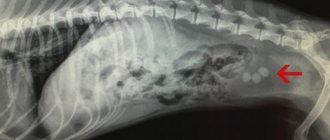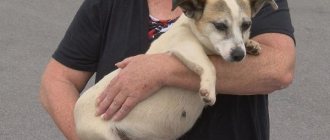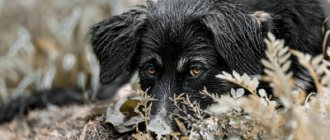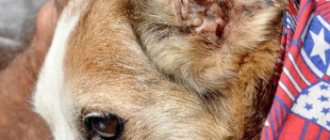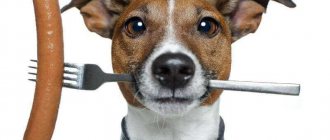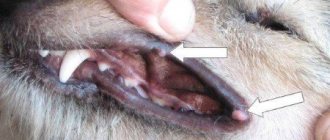Normal dog poop
The dog has bowel movements 3-4 times a day. If it's less, it's okay. The waste products of a healthy dog range from light to dark brown.
The dog relieves itself
The consistency is moderately dense, without breaks or inclusions. After defecation, feces for some time retain the shape of a smooth “sausage” with a damp sheen and a not strong odor. In circumference, the discharge product is equal to the size of a dog's anus.
It is normal for small fragments of the “sausage” to fall out in the form of circles with the same healthy shine. The owner understands that there is not enough fiber in the diet.
But there are deviations from the norm for dog stool:
- The discharge is formed correctly, but at the end of the bowel movement a liquid mush is poured out - dysbacteriosis or infection is possible.
- There is mucus and blood in the stool - worms or there is a lot of raw meat on the menu.
- There is undigested food in the feces with a sour smell, defecation more than three times a day - it is necessary to establish a balanced diet.
- White coating on hard feces - bones are removed from the diet.
- A dog with black stool is a sign of bleeding internal ulcers. We are talking about damage to the upper gastrointestinal tract or small intestine. The reason may be eating rat poison that the dog found somewhere.
Important! The most life-threatening feces for a pet are liquid feces with bloody foam. Immediately call an ambulance to save the animal.
Sick animal
Treatment of acute diarrhea in dogs at home
For healthy adult dogs with mild diarrhea without other symptoms:
Make sure your dog has unlimited access to clean water to avoid dehydration. Encourage your dog to drink. If necessary, offer diluted low-sodium chicken or beef broth or rehydron in addition to water.
Give your dog a small portion of cooked white meat chicken (boneless, skinless) and white rice - you can also use cooked sweet potato or pumpkin instead of rice. (Pumpkin and sweet potatoes can also be added to your dog's regular diet to increase fiber intake). You can feed this diet to your dog until the stool consistency returns to normal. If your dog is allergic to chicken, you should replace the protein with another hypoallergenic option.
If diarrhea continues for more than 24 hours or your dog's condition worsens at any time, call your veterinarian immediately.
The main causes of black feces in dogs
Dark stool indicates that the dog is bleeding internally. If the blood comes from the anus or colon, it is scarlet or bright red. But when it is treated with digestive enzymes, it turns black. This means that the cause of bleeding is located deep in the internal organs - the stomach, small intestine.
A cat has a black nose: causes of discharge and treatment options
Serious causes of black feces in dogs:
- Worms. They live on the intestinal mucosa, first destroy it, then get to the animal’s blood. Some of it enters the intestinal cavity and is then excreted.
- Infection. More often it is a parovirus. Blood comes out in clots, feces are unevenly colored.
- Stomach ulcer. A serious illness when black poop is observed in a dog.
- Hemorrhagic gastroenteritis. It occurs as a complication after infections, inflammation of the gastrointestinal tract, due to circulatory disorders.
Important! It is difficult to determine the nature of dark excrement on your own, so contact a veterinarian.
At the veterinarian's appointment
The most common digestive problems in dogs
The digestive system is very vulnerable in both humans and dogs. Her health largely depends on proper nutrition and caring for the animal.
She is one of the first to react to the lack of healthy food, the occurrence of a serious illness, and various symptoms immediately appear. For example, a pet refuses to eat, and black feces may appear during a walk.
What diseases of the gastrointestinal tract occur in four-legged animals?
Black feces are a very alarming symptom that indicates that there is blood in the dog's feces. It can be either liquid or very dense, but one thing is clear - some serious pathological process has begun in the pet’s body. A visit to the veterinarian is required.
Black feces usually tell the dog owner that the animal is bleeding in its internal organs. Typically, dark feces indicate that blood is oozing somewhere above the colon as it moves through the digestive system. It is possible that the dog’s internal organs have some kind of damage, although in fact there are many reasons for the appearance of black feces.
Symptoms and causes
Normally, a dog's feces are quite dense, but not hard, and colored brown in various shades. The presence of bright red or dark, almost black discharge in it can be a consequence of various diseases. Why do they appear?
- The presence of a foreign object in the digestive tract. For example, while gnawing on a bone or stick, the dog swallowed a piece with sharp edges, and it damaged the intestinal wall. Usually in this case the animal does not eat and experiences pain when palpating the abdomen.
- Worms, especially when there are a lot of them, can severely damage the walls of the small intestine. They feed by clinging to it and consuming the dog's blood. If a pet is infected with worms, then it will not only have black feces, but also a lot of other signs. A dog may refuse to eat or, conversely, eat a lot and lose weight; there are parasite eggs in its feces.
- Hemorrhagic gastroenteritis, which is usually encountered by small breed dogs. This is an inflammation of the stomach and small intestine. The dog is vomiting, and the feces contain a lot of blood.
- Parvovirus enteritis is a deadly viral disease in dogs that must be treated. Small puppies are most often affected. The main symptom of this disease is bloody, loose stools. Blood is usually present in it in the form of dark clots.
- Peptic ulcer disease occurs not only in humans - dogs also suffer from it. Black feces in this case usually occur in the later stages of the disease.
Treatment
Only a veterinarian can prescribe the correct treatment for black stool after determining its cause. All of the above diseases require a special approach, and one treatment method cannot be chosen here. One thing is clear - you should immediately rush to the veterinarian, after remembering when the animal was vaccinated, whether deworming was carried out and what the dog ate.
Gastroenteritis
Gastroenteritis is inflammation of the stomach and small intestine. This disease should under no circumstances be ignored, and it won’t work – its symptoms are quite vivid. The video talks about gastroenteritis.
Tips for prevention and treatment
To avoid having to treat gastritis in dogs and diseases such as gastroenteritis and enterocolitis, you should simply follow a few preventive rules. They will also help you avoid volvulus.
- feed your pet only food from proven brands or high-quality fresh food;
- make sure that the animal does not chew bones, sticks and other objects from which it is easy to tear off a sharp piece;
- do not walk your puppy without vaccinations;
- avoid contact with sick animals;
- make sure that the dog does not pick up anything on the street;
- where the dog lives should always be clean;
- change the diet smoothly;
- Do not give your pet pork. Loading …
"Diseases of the gastrointestinal tract in dogs"
In the next video from the Dog-channel.tv channel, you will learn about the symptoms of gastrointestinal diseases in dogs and their causes.
Source: //dalmspb.com/zdorovie/chernyj-kal-u-sobaki-9925/
Physiological reasons
Black Spitz: Pomeranian black and tan or black and white dog
There is no need to panic right away. If it is a one-time occurrence, the explanation may be simple. It is possible that the dog was prescribed iron-based medications or vitamin supplements with ferrum during this period. Then the dog’s dark feces will be natural.
Also, the color of stool changes when activated charcoal is given to a dog that is poisoned. The same thing happens if the dog is fed raw meat or blood meal with black licorice is added to the food.
The owners in these cases continue to monitor their four-legged friend. Contact the clinic if other signs of ill health appear: lethargy, fever, refusal to eat.
How to prevent diarrhea in dogs? Prevention
Here are some ways to reduce the occurrence of diarrhea in dogs:
- Don't suddenly change your dog's diet.
- Don't give your dog bones or toys (rubber chew toys are best).
- Don't let your dog play with small objects that he might swallow.
- Don't feed your dog table scraps.
- Don't let your dog pick up or chew trash while out on walks.
- Always have your dog vaccinated and treated for worms and other parasites.
Learn more about how to properly use a soft diet to treat dogs with diarrhea. For any questions, consult a veterinarian!
^Top
What did you eat?
Jack Russell Terrier: black, white, brown, tri-color and other colors
During walks, four-legged animals sniff out and pick up inedible things from the floor: plastic objects, stones, sticks. Small puppies are often guilty of this: York terriers, dachshunds, Rottweilers. A sharp foreign object can cut the thin wall of the stomach - hence the blood in the digestive tract and dark stool in the dog. The same condition develops after food poisoning.
You need to watch what your dog puts in his mouth while walking.
The color of the feces depends on the food that the owners offer the animal. Raw liver, other offal, and uncooked meat will give the feces a dark or black color.
Important! There is no reason to worry if the puppy is cheerful, active, with neat fur and clear eyes.
Emergency care for diarrhea in dogs
You should call your veterinarian for advice on how to deal with diarrhea if your dog (or better yet, take your pet to a veterinarian immediately):
- Very young or very old
- Has existing health problems
- Weight loss
- Oppression
Pets can become seriously malnourished and lose weight quickly, even if they are suffering from relatively mild diarrhea.
Also call or see your veterinarian if your dog has diarrhea:
- Frequent and/or very watery
- Contains a large amount of blood (more than just a streak of blood)
- Dark, black and tarry, resinous
OR if your dog has other serious symptoms:
- frequent and profuse vomiting
- lethargy - severe depression
- depressed general condition
- pain
- weight loss
These may be signs of potentially serious illnesses.
If your dog is otherwise healthy and the diarrhea is mild, it is wise to try some home treatments.
Signs of pathology
A sensitive attitude towards your pet helps to avoid many canine ailments. If, along with dark stools, the dog has changed its behavior, has become apathetic, its eyes become sour, suffers from flatulence, and vomiting appears, contact a specialist.
The following pathologies are accompanied by black feces.
Gastric volvulus
Responsible breeders monitor the diet of their shaggy friends. Animals must eat three times a day. High-quality products and the right amount are easy to digest - dogs do not develop stomach illnesses.
But rare feeding in large portions, long active games immediately after meals, stress sometimes lead to volvulus of the stomach (intestines). At this moment, one of its sections is twisted, and blood flow in it is disrupted. Tissue necrosis begins. The dead part of the intestines provokes blood poisoning.
Important! When your stomach turns upside down, the minutes count. If the dog is not taken to the clinic within two hours, death is inevitable.
You can notice signs of trouble by the following symptoms:
- The dog cannot go to the toilet when absolutely necessary.
- Her stomach is swollen, she whines and nuzzles him.
- The animal does not eat or drink.
- The dog suffers from nausea and vomiting.
Such animals are saved by surgery. The main thing is not to get confused and call for help in time.
Oncological diseases
Stomach cancer, which is accompanied by black liquid feces in dogs, is not a common occurrence. This is the karma of large dogs: collies, terriers, shepherds, bull terriers. Older individuals, more often males, become ill.
Important! Veterinarians do not name the exact cause of the disease. They think it's stress, unhealthy diet, toxins, radiation.
The onset of the disease occurs without specific symptoms. The animal moves less and eats poorly. Owners are alarmed by weight loss, vomiting, belching, and gases with the smell of a rotten egg.
A malignant tumor is diagnosed in the clinic. Treatment often leads to positive results.
Oncological diseases need to be detected early
Manifestation of diarrhea
Indigestion is caused by spoiled foods, helminths, food allergies, gastritis, infections and poisoning, and overeating. The stool becomes liquid and dark in color.
Diarrhea for several hours or one day is normal. The dog is fed less and given a lot of water. But if the condition drags on for several days, the patient is taken to the doctor. The specialist identifies the cause and prescribes treatment. Advice from fellow dog breeders can lead to serious consequences.
Important! Diarrhea is dangerous due to dehydration and metabolic disorders.
Hemorrhoidal bleeding
The dog has prolonged constipation, hard feces with blood, itching and redness around the anus. She tries to reduce discomfort by crawling on the floor on her butt and often licking the anus.
All signs indicate that the pet has hemorrhoids - the hemorrhoidal veins have dilated, and blood has stagnated in them. This ends with the protrusion of the nodes from the anus, or they are localized in the rectum.
Hemorrhoids in a dog
They treat with enemas, suppositories, soft nutrition. The disease is usually easy to treat.
Infectious, toxic gastroenteritis
The causes of the disease are viruses, intoxication, bacteria. The disease is accompanied by striking symptoms: black loose stools, weakness, intestinal colic. The body temperature rises, the pet begins to drool, and the heartbeat quickens. Paws, nose and ears become cold, vomiting bile and blood.
Treatment begins with fasting. The dog is given only a drink, then boiled rice in small portions. The veterinarian prescribes strengthening agents and antibiotics.
Enterocolitis
Acute and chronic forms occur against the background of inflammation in the large and small intestines. The influence is caused by infections and poisoning, an indigestible object in the stomach.
Symptoms:
- fever;
- thin black stool;
- bloating, nausea.
In the chronic course of the disease, the dog loses weight, crawls on the floor, and licks the anus.
Complex treatment includes diet, gastric lavage, and IV drips to restore water balance. Medicines include a course of antibiotics, dewormers, and anti-inflammatory drugs.
Enterocolitis
Enterocolitis is a set of inflammatory processes that develop in the small and large intestines. It can be both chronic and acute.
Symptoms and causes
Very often, enterocolitis occurs as a result of an infection, poisoning, ingestion of a foreign body or helminthic infestation. Old animals or puppies are most susceptible to the development of pathology - often the disease can kill them within a couple of weeks. Often the cause is a change in food, so it is recommended to change the animal’s diet gradually, over 1-2 weeks.
The main symptom of enterocolitis is loose stools, which are periodically followed by constipation. After some time, mucus appears in the stool, and then blood (black feces). The dog also experiences abdominal pain, bloating, nausea and often shaking. Another characteristic sign of enterocolitis is loud rumbling in the stomach, especially during palpation.
With chronic enterocolitis, the dog quickly loses weight and becomes lethargic. In acute cases, she is very worried about the area near the anus - the animal constantly licks this place and crawls along the floor.
Treatment
You should not treat the disease yourself - you should definitely go to the veterinarian as an emergency. The fact is that enterocolitis is very similar in symptoms to other diseases. These are plague, enteritis, leptospirosis and others. Only a doctor can make an accurate diagnosis.
The main therapeutic measures are as follows:
- strict diet, it is better not to feed the animal at all for a couple of days. You can only give rice water and water;
- cleansing the stomach and intestines with castor oil;
- if severe dehydration occurs, the veterinarian will administer IVs;
- depending on the cause of enterocolitis, the doctor may prescribe antibiotics, prescribe an anti-helminth drug, but in any case will prescribe an anti-inflammatory;
- Also, the dog is often prescribed antispasmodics, vitamin complexes, and enzymes. After treatment of enterocolitis and stabilization of the dog’s condition, it should be fed medicated food for a long time. If the animal is on a natural diet, then it is important to carefully monitor every ingredient it eats.



